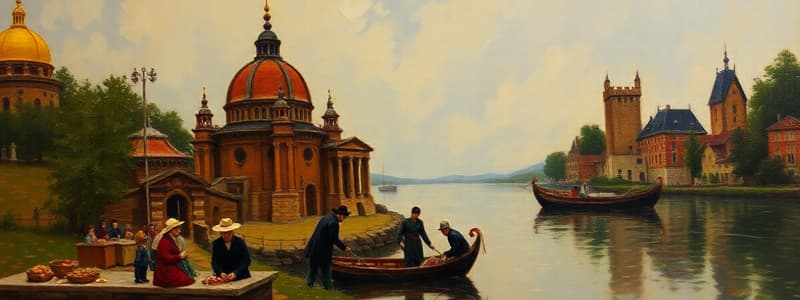Podcast
Questions and Answers
Which aspect of social structure primarily involves kinship ties and communal relationships?
Which aspect of social structure primarily involves kinship ties and communal relationships?
- Gender Roles
- Hierarchy
- Community & Family (correct)
- Roles
What is a primary function of a bureaucratic system in a civilization?
What is a primary function of a bureaucratic system in a civilization?
- Establishing social classes
- Creating artistic expressions
- Cultivating agricultural land
- Implementing policies and managing state affairs (correct)
Which of the following is NOT generally considered a cultural achievement?
Which of the following is NOT generally considered a cultural achievement?
- Literature
- Religion and Beliefs
- Agricultural innovations (correct)
- Art and Architecture
What technological advancement directly impacts trade and communication in a civilization?
What technological advancement directly impacts trade and communication in a civilization?
Which governmental system is characterized primarily by the rule of a single individual?
Which governmental system is characterized primarily by the rule of a single individual?
Flashcards are hidden until you start studying
Study Notes
Characteristics of a Civilization
Social Structure
- Hierarchy: Society is typically divided into classes or groups (e.g., nobles, merchants, laborers).
- Roles: Defined roles within the community (e.g., leaders, warriors, priests).
- Community & Family: Importance of family units and communal relationships; kinship ties often influence social standing.
- Gender Roles: Differentiation in roles and social statuses based on gender; often patriarchal, but variations exist.
Political Organization
- Government: Establishment of governance systems (e.g., monarchies, democracies, theocracies).
- Law and Order: Creation and enforcement of laws; judicial systems to resolve disputes.
- Territorial Control: Management of land and resources; often involves territorial expansion or conquest.
- Bureaucracy: Administration and organized structures to implement policies and manage state affairs.
Cultural Achievements
- Art and Architecture: Expressions through painting, sculpture, and monumental architecture (e.g., temples, palaces).
- Religion and Beliefs: Development of organized religions; mythology, rituals, and spiritual practices.
- Literature: Creation of written works; historical records, poetry, and storytelling.
- Education: Establishment of schools and the promotion of knowledge; preservation of culture and learning.
Technological Advancements
- Agriculture: Innovations in farming techniques; irrigation, crop rotation, domestication of animals.
- Tools and Machinery: Development of tools for construction, warfare, and daily tasks (e.g., plows, weapons).
- Transport: Improvements in transportation (e.g., roads, ships) facilitating trade and communication.
- Science and Medicine: Advancements in understanding natural phenomena; development of medical practices and treatments.
Social Structure
- Civilizations often have a hierarchical structure, with different classes or groups based on wealth, power, or occupation.
- Roles within a society are defined, with individuals taking on specific responsibilities based on their position within society.
- Family units are usually very important, and kinship ties often determine social standing.
- Gender roles are clearly established, with men often holding more power and authority than women.
Political Organization
- Civilizations establish government systems to manage their affairs, ranging from monarchies to democracies.
- Laws and order are crucial for maintaining control and resolving disputes.
- Civilizations typically control a defined territory, and often engage in territorial expansion or conquest.
- Organized structures, such as bureaucracies, are needed to manage the state's affairs and implement policies.
Cultural Achievements
- Civilizations are characterized by a variety of artistic and architectural expressions, such as paintings, sculptures, and monumental buildings like temples and palaces.
- Organized religion often plays a significant role, shaping beliefs, practices, and rituals.
- Civilizations produce written works, including historical records, poetry, and stories that reflect their cultural identity.
- Formal education systems are often established to teach the younger generation and preserve knowledge.
Technological Advancements
- Civilizations make advancements in agriculture, including irrigation, crop rotation, and animal domestication.
- They create tools and machinery for various purposes, including construction, warfare, and daily tasks.
- Improvements in transportation, such as roads and ships, facilitate trade and communication.
- Civilizations develop scientific knowledge and medical practices, improving their understanding of nature and human health.
Studying That Suits You
Use AI to generate personalized quizzes and flashcards to suit your learning preferences.




